As I write this on Sunday afternoon, National Guard troops have begun showing up in Los Angeles. President Trump invoked a rarely used law to order 2,000 troops to LA after clashes between protestors and federal immigration agents.
According to the New York Times, it’s the first time since 1965 a president has ordered federal troops to a US city without a request from that state’s governor. California Governor Gavin Newsom rebuked Trump’s power play. “That move is purposely inflammatory and will only escalate tensions,” Newsom said. Which is exactly what Trump wants. He will use any excuse to show his base he’s a tough guy. Especially against all those woke California liberals.
Trump’s move and his travel ban earlier this week both recall the Reichstag fire in Berlin in 1933. It behooves us to be aware of this bit of history because Trump’s actions are eerily reminiscent of some moves by Hitler.
Crackdown on rights
In February 1933, the Reichstag building, home to Germany’s parliament, was badly burned due to arson. Although the origins of the fire were always murky, most historians blame a Dutch communist for the fire. Hitler, sworn in as chancellor a mere four weeks earlier, used the fire to falsely claim communists were planning to overthrow the German government. He issued an emergency decree suspending the right to assembly and freedom of the press, and permitted Hitler’s troops to arrest and imprison political opponents without a specific charge. The Reichstag Decree remained in place until the Nazis were overthrown in May 1945.
Although we’re not to that point yet, there are two examples this week of Trump using a singular incident to issue crackdowns that are overreactions.
Sending National Guard troops to Los Angeles is the most recent. Earlier this week, he issued a travel ban on 12 countries, saying, “We don’t want ‘em.” In a video announcement, Trump mentioned the Molotov cocktail attack by an Egyptian national that injured 12 pro-Israeli demonstrators in Boulder, Colorado. Egypt isn’t even on the banned list.
To be clear, no one should be throwing firebombs at protestors and no protestors should be violently attacking immigration agents. Americans have a right to peacefully protest, and those who break the law should be fully prosecuted.
But exploiting these incidents, which don’t exactly rise to the level of mass mayhem, to flex the power of the federal government more broadly, indicates Trump’s willingness to use anything that goes wrong in our country as an excuse to bring the hammer down. It’s not a stretch of the imagination to fear he’s on the lookout for anything that happens, particularly in blue states, to take away people’s rights, to arrest people without criminal charges, and ship them off to other countries.
Why we should care about Germany
I will admit to being overly sensitive about the faintest signs of authoritarianism. I’m far from a World War II scholar, but I would guess I’ve read more than 100 books about the war. The reason? My dad, who landed in the south of France in December 1944 just prior to his 19th birthday. With rifle and helmet, he battled his way into Germany, turning 19 in a snow-filled foxhole. His unit took many casualties.
My father miraculously survived, returned home, started a family and was the most peaceable, non-confrontational guy you would ever meet. He’d seen enough fighting to last a lifetime.
He rarely talked about his war experiences. Only later in life, when I’d read enough books to have some understanding, would he tell me stories. In a foxhole during an artillery barrage, his foxhole mate asked a question and in the second it took my dad to turn his head to answer, his buddy’s face was gone.
I’ve tried to educate myself by reading books. (Some recommendations in the postscript below.) I’ve traveled to Normandy, walked the beaches and paid respect to the fallen.
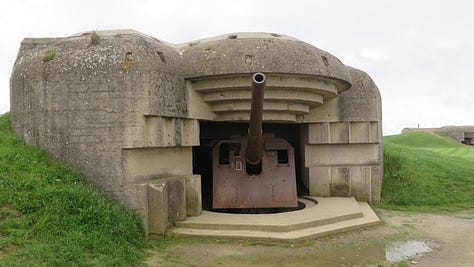
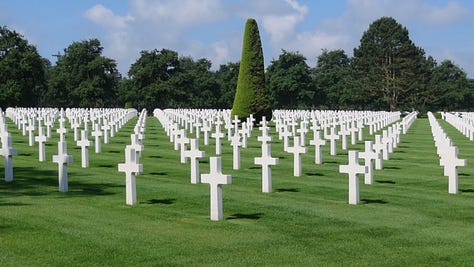
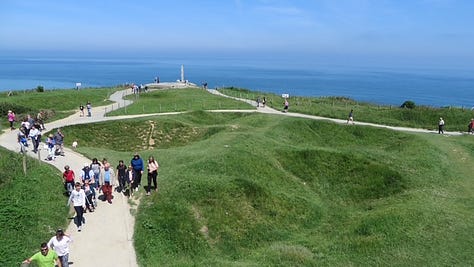
Last fall, I visited Berlin and toured the reconstructed Reichstag building, home once again to a united German parliament.
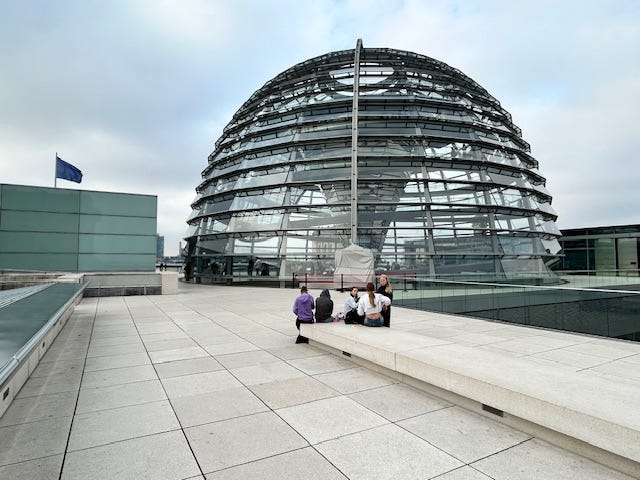
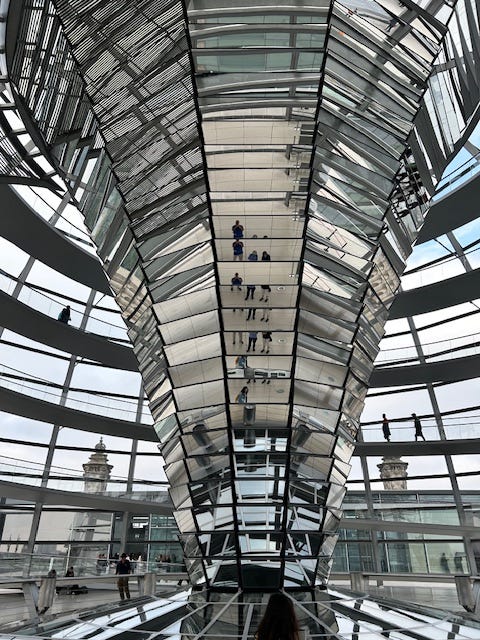
The dome that burned in the 1933 fire has been replaced with an all-glass dome. The architectural message is to let light in on the parliament below, so that never again can Germany be ruled by the forces of darkness.
My focus on history is a way to honor my dad’s service - to thank him and all of the Allies who fought so we could be free. I don’t want to take that freedom for granted or think that it’s not possible for darkness to overtake our country.
Trump shows a shocking ignorance of history
Last week, while visiting in the Oval Office, German Chancellor Friedrich Merz reminded Trump that the next day was the June 6th anniversary of D-Day. Trump replied, “Not a great day for you. That was not a great day,” as if it had been a sporting event and the team Merz was rooting for had been blown out.
Merz calmly told Trump, “This was the liberation of my country from Nazi dictatorship.”
As ignorant as Trump may be about history, he has an innate understanding of tools dictators throughout history have used to exploit one incident to seize power for themselves and rob people of their rights.
This week’s two examples don’t rise to the level of the Reichstag Decree. But Trump is always pushing ethical and legal limits, seeing what he can get away with, daring opponents to stop him. To think that a Reichstag fire moment “couldn’t happen here” sometime in the next three-and-a-half years would be foolish.
Postscript
Put a nickel in me and I’ll go on and on about the moving WWII books I’ve read. If you really want to understand the epic battles, here are a few I recommend.
The Liberation Trilogy - three books by Washington Post reporter Rick Atkinson. Outstanding. Book one is about the battle for North Africa, book two is about the amphibious landing on Sicily and the fight up the Italian boot, and book three is the more familiar story of the Normandy invasion and the struggle across the Rhine.
Masters of the Air by Donald Miller. Last year’s HBO series was based on this book, which goes into much deeper detail about the brutality of the bomber war.
Band of Brothers, Citizen Soldiers, The Wild Blue, and Pegasus Bridge - all by Stephen Ambrose. Essential reading.
I could go on - the Battle for the Atlantic, the bouncing bomb, Enigma, the death camps, the heavy water war, American isolationists. If you want more recommendations, let me know. And thank you for letting me geek out.
Here’s the current roster of the Iowa Writers’ Collaborative, of which I am a proud member.





Your father. His service. 🙏
Whew! Terrifying! Amen to your thoughts!
Linda Kent